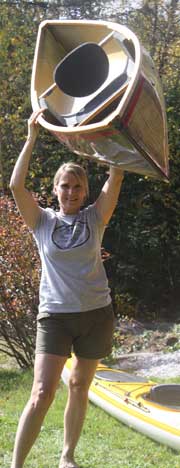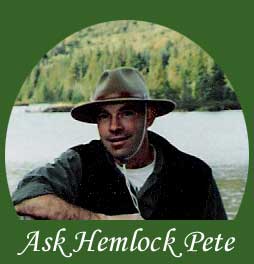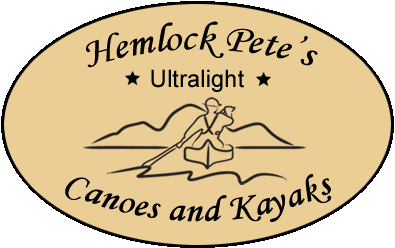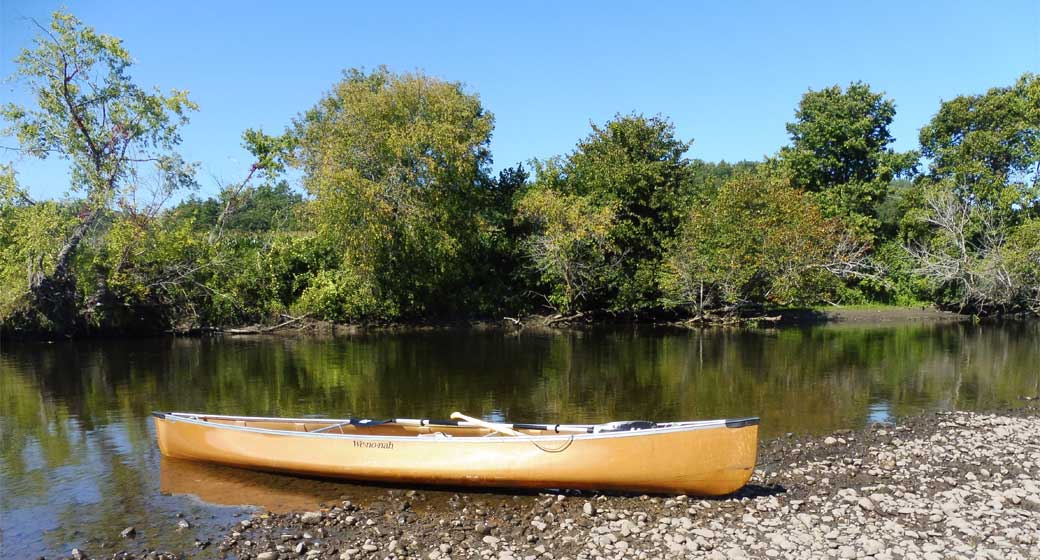




![]() Ultralight boats!
Ultralight boats!
Maps
I received a Christmas card from a friend of mine the other day containing
one of those family newsletters. In it, his wife Susan details all of
the family activities over the last year ending with a short paragraph
about Bob. It reads very simply, "CANOEING", topped off with
a 10-day trip on the Demoine River in western Quebec last summer. I'm
very jealous and also delighted. I can remember some 10 years ago canoeing
with Bob on the Deerfield river near his home in Whately Ma. We ran a
small section of very mild white water during which Bob turned into your
classic "GUNNEL GRABBER". I haven't seen him for a few years
but it sure sounds as if he has gained a bit of canoeing confidence. It
is guaranteed that he will spend the winter reviewing trip notes and pictures,
along with pouring over maps and charts planning for the next trip. Susan
in their Christmas letter called it his once in a lifetime trip. Well
I am sure she knows as well as I do, this is wishful thinking.
One of my favorite winter pass times is playing around with maps, looking
at past trips and constantly searching and laying out new ones. I can
spend hours, even days at this. Just ask my wife and kids. Chances are
if you come to visit anytime between now and early spring you will find
our dining room table cluttered with maps and guidebooks. I am not quite
sure where this passion came from. Most likely it was inherited from my
grandfather, the one who nick named me Hemlock Pete. In fact it is his
collection of 1897 series topo maps of the Adirondacks that I get the
most enjoyment from.
Topo maps (U.S. Geological Survey Topographical maps) are great fun.
Once you get a feel for reading them you can literally explore an area
before you ever get there. The contour lines show you the lay of the land
(and water) allowing you to pick out many natural and man made features.
For example; dams, waterfalls, ravines, cliffs, gorges, etc. If you are
not well versed in the use of topo maps, raised relief maps may be your
ticket. A raised relief map takes those contour lines and actually raises
them up off the page giving you a three dimensional view of the area.
Even if you are an expert with topo's, raised relief gives you something
to check your map interpretation skills against. U.S.G.S. topo maps cover
a small area and are relatively easy to get hold of. Most outdoor shops
carry them and even some bookstores. Raised relief maps on the other hand
cover a much larger area and are a bit more difficult to locate.
You tend to find them in unlikely places. The last one I purchased was
from the gift shop at the Balsams Resort in Dixville Notch, N.H. Another
good source for maps and charts are guidebooks. As an added bonus, along
with the maps you get some very enlightening written information about
the waterways covered in the book. .
As I sit at the table pouring over my maps, I enter a dream world picturing myself on a trip somewhere out in the middle of nowhere surrounded by magnificent lakes, rivers, forests and mountains. I tend to be partial to the Northeastern forests, but my journeys take me all over the world. If I could travel through time I would pick the turn of the century. (The 20th century that is) I find this era truly fascinating simply because so much of the northern wilderness had yet to be explored or developed. Just getting there was sometimes an expedition in itself. Most of the roads we use today did not exist and what little transportation infrastructure that was in place was limited and tended to be railroads. This for me even adds to the mystique of the time period. Just imagine traveling for days in a railroad car along with your canoe and supplies headed for some lonely river crossing to start your trip. Now I know this is not for everyone but for me it is pure heaven. Actually you can still do this today in some of the more remote areas of Canada. Take a look at a map of Northern Canada sometime; if you are anything like me your imagination will go wild.
If you really feel ambitious, consider China, or the former Soviet Union. There has got to be some wonderfully wild, undeveloped territory left there. Several years ago while standing in the Chinese exhibit at Epcot center surrounded on all sides by scenes of the Chinese wilderness I remember thinking what a great place this would be to explore. The northeastern regions of the Soviet Union must be equally as desolate if not more so. The volume of territory is mind-boggling.
Until next time, HAPPY PADDLING!!!

Have a question? I'm happy to answer it - just email me at hpcanoes@gmail.com
![]()
hpcanoes@gmail.com
603.667.5112

We specialize in ultralight solutions and offer expertise in canoes and Wee Lassie boats, as well as all the related equipment. Our favorites are Wenonah canoes and Wee Lassie boats. Although we will work with any material we like to get folks set up with lightweight canoes so you can dedicate your time to the joy of being out on the lakes and rivers instead of struggling to move your boat between car and water.
Scott Edwards, "Hemlock Pete" himself, offers you decades of paddling expertise. He is friendly, down-to-earth, and provides superior customer service. You won't find a better, or more pleasant, deal elsewhere.

